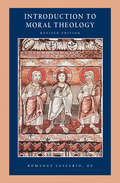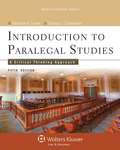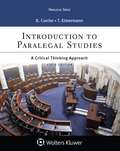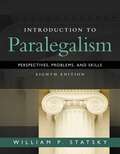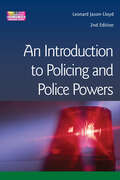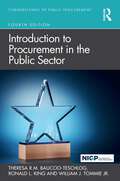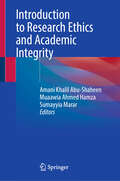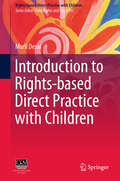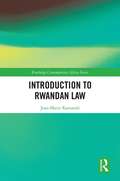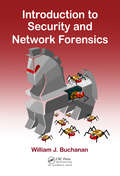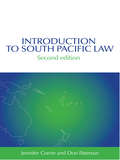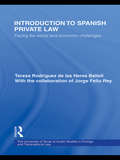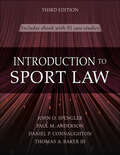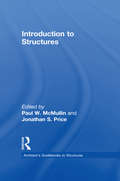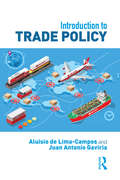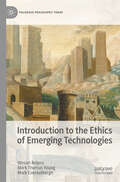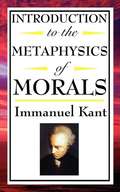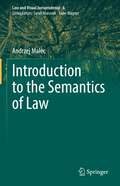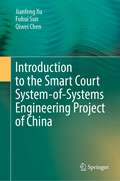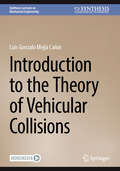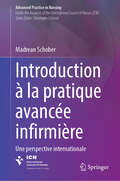- Table View
- List View
Introduction to Moral Theology (Catholic Moral Thought #1)
by Romanus CessarioThe comprehensive introduction to Catholic moral theology by the leading theologian and author of The Moral Virtues and Theological Ethics. In Introduction to Moral Theology, Father Romanus Cessario, O.P. presents and expounds on the basic and central elements of Catholic moral theology written in the light of Veritatis splendor. Since its publication in 2001, this first book in the Catholic Moral Thought series has been widely recognized as an authoritative resource on such topics as moral theology and the good of the human person created in God&’s image; natural law; principles of human action; determination of the moral good through objects, ends, and circumstances; and the virtues, gifts of the Holy Spirit, and the Beatitudes. The Catholic Moral Thought series is designed to provide students with a comprehensive presentation of both the principles of Christian conduct and the specific teachings and precepts for fulfilling the requirements of the Christian life. Soundly based in the teaching of the Church, the volumes set out the basic principles of Catholic moral thought and the application of those principles within areas of ethical concern that are of paramount importance today.
Introduction to Paralegal Studies: A Critical Thinking Approach (Aspen College Series)
by Thomas Eimermann Katherine CurrierThis comprehensive, intelligent overview covers all the key concepts addressed in a typical introduction to paralegal studies course and teaches students the basic skills necessary to understand statutes and court cases. The carefully organized, accessible text combines an introduction to law and legal concepts with practical information about what paralegals actually do in the legal system. A critical thinking approach introduces students to the study of law, encouraging them to interact with the materials through hypotheticals, examples, and well-designed questions. Introduction to Paralegal Studies: A Critical Thinking Approach is divided into four parts, reflecting the progression of an introductory course: Part I: Paralegals and the American Legal System; Part II: Substance of the Law; Part III: Legal Analysis and Research; Part IV: Paralegals and the Work World. Strong pedagogy includes ethics alerts, marginal definitions, Internet references, and legal reasoning exercises throughout the book. An excellent ancillary package is available to instructors, with a comprehensive Manual, in-depth test bank, and PowerPoint slides.
Introduction to Paralegal Studies: A Critical Thinking Approach (Aspen Paralegal Ser.)
by Thomas Eimermann Katherine CurrierComprehensive, intelligent overview of all the key concepts covered in a typical introduction to paralegal studies course. Introduction to Paralegal Studies, Sixth Edition combines an introduction to law and legal concepts with practical information about what paralegals actually do in the legal system. A critical thinking approach used to introduce students to the study of law, encouraging them to interact with the materials through hypotheticals, examples, and well-designed questions. The text is divided into four parts, reflecting the topics addressed in an introductory course: Part I: Paralegals and the American Legal System Part II: Substance of the Law Part III: Legal Analysis and Research Part IV: Paralegals and the Work World.
Introduction to Paralegalism: Perspectives, Problems and Skills (Eighth Edition)
by William P. StatskyMaster the hands-on skills you'll need to succeed in a modern law office with <i>Introduction to Paralegalism, 8e</i>. Ten critical skills are covered in the book: identifying legal issues, breaking rules into elements, applying rules to facts interviewing clients, investigating facts, digesting discovery documents, providing litigation assistance, researching the law, drafting documents, and representing clients at administrative agencies where authorized by law. Packed with real-life insights and real-world examples, the text helps you understand the ethical guidelines that lawyers and paralegals must follow and covers the efforts underway to regulate the profession in legislatures, courts, bar associations, and paralegal associations.
Introduction to Policing and Police Powers
by Leonard Jason-LloydThis book provides clear and comprehensive coverage of the policing system and police powers. This second edition has been revised and updated to take account of new legislation, case law and other developments in the area.
Introduction to Procurement in the Public Sector (Cornerstones of Public Procurement)
by Theresa R.M. Bauccio-Teschlog Ronald L. King William J. Tommie Jr.Public procurement is an exciting, challenging profession that is responsible for the procurement of goods, services, and construction at every level of government, estimated at nearly 13 trillion US dollars worldwide. Public procurement professionals often work behind the scenes to promote responsive and responsible government, improving the quality of life for the people in their communities. Introduction to Procurement in the Public Sector, Fourth Edition is designed to provide an overview of the field, introduce the reader to the public procurement profession, and explore the wide variety of responsibilities and practices that must be addressed throughout the public procurement cycle.This book offers a thorough and complete overview of the function and profession of public procurement, explores legal frameworks, examines contract administration, and investigates a variety of solicitation methods and processes, with an emphasis on what happens post-award, including surplus and disposal. Introduction to Procurement in the Public Sector, Fourth Edition provides the reader with a comprehensive understanding of the public procurement profession, as well as insight into methods, strategies, and tools for successful and ethical procurement practice. The book is an ideal primer for those entering the field of public procurement and serves as a comprehensive textbook for courses in public administration, supply chain management, and related fields of study.
Introduction to Psychology and Law
by Regina A. Schuller James R.P. OgloffDespite the notable Canadian presence in the field of psychology and law, there is currently no comprehensive Canadian textbook on the subject. While a few U.S. textbooks cover the field, they give little or no attention to Canadian law and research. In recognition of this problem, editors Regina Schuller and James Ogloff have put together an authoritative introduction to law and psychology for a Canadian audience. Within the fifteen chapters that comprise the book, leading Canadian scholars cover a wide range of topics spanning the applications of psychology - clinical, social, cognitive, developmental, experimental - in both criminal and civil areas of law. These include memory and eyewitness testimony, the jury, sentencing, competency to stand trial, criminal responsibility, and many others. The legal system in Canada serves as the backdrop for each of the chapters, which begin with an interesting case or anecdote that introduces the reader to some of the major issues facing psychologists and lawyers in this country.The book offers a compelling introduction to the field and a unique perspective to Canadian readers, especially students in psychology, criminology, and other disciplines in social science and law.
Introduction to Research Ethics and Academic Integrity
by Amani Khalil Abu-Shaheen Muaawia Ahmed Hamza Sumayyia MararThis book provides an overview of conducting ethical and rigorous research with an emphasis on key topics, including informed consent, confidentiality, and conflicts of interest. Not only do the chapters cover various forms of academic misconduct, but they also provide practical guides on how to avoid these pitfalls. Additionally, it also addresses issues related to plagiarism and includes information on the ethical use of AI tools. Further chapters highlight ethical practices, accurate reporting, collaboration, and predatory publishing. A separate chapter delves into robust strategies and policies to combat misconduct and preserve integrity. The book is supplemented with real-world case studies and provides recommendations on academic integrity and research misconduct. The book is relevant for students, researchers, scholars, academicians, and professionals alike, helping them understand the importance of research integrity.
Introduction to Rights-based Direct Practice with Children
by Murli DesaiThe Sourcebook introduces the theoretical and ideological foundation and methodological basis of Rights-based Direct Practice with Children. It starts with the methodology of participatory group workshops to facilitate learning of the content. The content draws linkages among the foundation of life skills; psychosocial, sociological and critical theories of childhood; and child rights values, categories and principles; with the approaches, methods and skills of direct practice with children. The book takes examples from India but makes significant contribution to training and reference material for child rights teachers, trainers, facilitators and field workers, across the world, especially in the developing countries.
Introduction to Rwandan Law (Routledge Contemporary Africa)
by Jean-Marie KamataliThis book explores key innovations in Rwandan law, exploring how the homegrown legal system with the civil law and common law legal systems. The author explores the history of Rwandan law through pre-colonial, to colonial and post-independence periods, examines the homegrown legal and justice approaches, such as Gacaca, Abunzi and Imihigo, introduced in post genocide Rwanda to deal with legal problems that could not be dealt with using the western legal system; and highlights the innovative Rwandan approach to incorporating international law in the domestic legal system. The book also covers the evolution of the Rwandan Constitutional Law and Constitutionalism since independence; the development of family law from a legal system that oppressed women to one that promotes girls and women rights. Finally, the book explores the contribution of common law in the transformation of the organization, jurisdiction and functioning of Rwandan Courts. This book will be of interest to scholars and students of African law, international law and the legal system in Rwanda.
Introduction to Security and Network Forensics
by William J. BuchananKeeping up with the latest developments in cyber security requires ongoing commitment, but without a firm foundation in the principles of computer security and digital forensics, those tasked with safeguarding private information can get lost in a turbulent and shifting sea. Providing such a foundation, Introduction to Security and N
Introduction to South Pacific Law
by Don Paterson Jennifer CorrinProviding an overview of the origins and development of the law and legal systems in the South Pacific, the authors examine the framework of legal systems in the region and the operation of state and customary laws. Exploring, not only the legal system generally, but also the constitution and jurisdiction of state courts and legislative provisions of individual jurisdictions and cases, it contains individual chapters on substantive areas of law. They cover: administrative law constitutional law contract law criminal law customary law family law land law tort law. Highlighting the distinguishing features of the substantive law in force in the South Pacific, this book is an essential resource for all those interested in the law of the South Pacific Islands region.
Introduction to Spanish Private Law: Facing the Social and Economic Challenges (UT Austin Studies in Foreign and Transnational Law)
by Teresa Rodriguez de las Heras BallellThe topics addressed in this book have traditionally been covered in separate publications on civil and commercial law. This dualism of regimes has made it difficult for students and professionals alike to comprehend Spanish private law as a whole. In the past this has led to inefficient duplication of explanations, gaps in key areas and an altogether fragmented picture. Introduction to Spanish Private Law presents a consolidated, modern, and realistic image of today’s Spanish private legal system. It combines both civil and commercial law and integrates them in the same book, making the overall subject far more accessible to readers. This united approach results in a more logical and efficient process of learning. Finally the issues that are addressed reflect the reality of today’s economic and legal scene. This book attempts to provide the readers with the necessary legal instruments to tackle the real problems arising from a globalized modern society. The general principles in this book are presented from a practical point of view that emanates from the authors’ conception of a legal system as an instrument to solve social problems in accordance with a set of principles, values and aims.
Introduction to Sport Law: With Case Studies in Sport Law
by Et Al. John O. SpenglerWith an accessible approach free of legal jargon, Introduction to Sport Law With Case Studies in Sport Law, Third Edition, provides a comprehensive examination of the fundamental legal issues commonly found in sport and sport management. Even students with little to no legal background will understand law topics relevant to the sport industry through the text’s straightforward examples and case studies that demonstrate sport law theory through real-world applications. Organized to cover all law categories that are most critical to the management of sport, the text first presents an overview of the United States legal system, including the court system, the various types of law, and legal resources. Students will then explore important topics such as risk management, employment law, gender equity, intellectual property, and constitutional law, examining the relevance of the law at hand to real-world applications across the field of sport management. This updated third edition allows students to increase their comprehension by looking at laws and issues through timely, modern points of view. New content reflects important topics and current legal issues, including the Equal Pay Act; the Sports Broadcasting Act; athlete safety and equipment concerns; name, image, and likeness (NIL) laws; antitrust litigation, unionization, and collective bargaining; and transgender athlete participation in sport. The updated content addresses contemporary challenges to constitutional law, including the First Amendment and Fourteenth Amendment, and it examines how budget problems related to COVID-19 resulted in cutting sports and raised Title IX issues. End-of-chapter discussion questions and In the Courtroom sidebars have been updated with current examples to better demonstrate modern applied perspectives. Moot Court Case sidebars now have accompanying questions on hypothetical scenarios, allowing students to understand the technicalities of sport law in practical application. Each chapter of Introduction to Sport Law, Third Edition, also directs students to relevant cases in the included ebook, Case Studies in Sport Law, Third Edition, by Andrew T. Pittman, John O. Spengler, and Sarah J. Young. Featuring abridged versions of 93 court cases, all carefully curated to provide real-life applications representing many of the multifaceted aspects of sport law, the ebook also includes review questions for each case to test comprehension and prompt in-class discussion. Through its focus on legal concepts with direct application to the world of sport, Introduction to Sport Law, Third Edition, provides students with the information they need to feel confident with the fundamentals of sport law. Note: This ebook includes both Introduction to Sport Law, Third Edition, and Case Studies in Sport Law, Third Edition.
Introduction to Structures (Architect's Guidebooks to Structures #1)
by Paul W. McMullin Jonathan S. PriceIntroduction to Structures - the lead book in the Architect’s Guidebook to Structures series - presents structures in simple, accessible fashion through beautiful illustrations, worked examples, and from the perspective of practicing professionals with a combined experience of over 75 years. It introduces the student to, and reminds the practitioner of, fundamental structural design principles. Beginning by introducing structural forms in nature and history, the process of design, and selecting structural systems and materials, the book then moves onto statics, mechanics of materials, and structural analysis. The final chapter provides guidance on preliminary structural design, complete with decision criteria and design tables. Edited by experienced professional structural engineers, with vital contributions from practicing architects, Introduction to Structures is fully illustrated, contains clear step by step examples and preliminary design guidance. Designed as a key textbook for introductory structures courses, it is also an indispensable reference for practicing architects.
Introduction to Trade Policy
by Aluisio Lima-Campos Juan GaviriaIntroduction to Trade Policy provides a comprehensive overview of the rules and regulations that govern trade flow. It discusses the trade policy formulation process of major international economic players, and analyzes existing trade policy tools that countries may resort to in order to take advantage of the benefits of international trade and to protect themselves against its dangers, as well as their implications for trade policy, law and negotiations. In Section I, the book explores the ways in which interest groups interact with government and legislators to shape trade policies. By developing an analytical view of trade policy formulation systems in the U.S., European Union, the BRICS countries (Brazil, Russia, India, China and South Africa), Canada, Mexico and Australia, the book will help the reader to gain a better understanding of these countries’ trade policy developments and also to apply such learning to the analysis of the trade policy formulation of any other countries. Section II goes on to explain how trade policy tools are used by governments to achieve trade and other policy objectives, while Section III analyses trade in services and the multilateral trade rules on Intellectual Property. Finally, Section IV uses hypothetical case studies in simulation exercises to illustrate trade policy decision-making and trade agreement negotiations in a bilateral, plurilateral and multilateral setting. This is the ideal introduction to international trade policy formulation for students and professionals in the areas of law, politics, economics and public policy who are seeking to develop a global view of international trade, gain insights into trade negotiations and understand the motivations behind the policies and actions of governments regarding international trade issues. This book is also the ideal companion to any traditional legal casebook on international trade or on international economic law.
Introduction to Transportation Security
by Frances L. Edwards Daniel C. GoodrichTransportation is the lifeline of any nation, connecting people, supporting the economy, and facilitating the delivery of vital goods and services. The 9/11 attacks and other attacks on surface transportation assets, including the bombings in Madrid, London, Moscow, and Mumbai demonstrate the vulnerability of the open systems to disruption and the
Introduction to the Ethics of Emerging Technologies (Palgrave Philosophy Today)
by Mark Coeckelbergh Wessel Reijers Mark Thomas YoungIntroduction to Ethics of Emerging Technologies offers a set of lecture and seminar course materials for teaching ethics of emerging technologies. It covers the field in a comprehensive and accessible manner, emphasizing storytelling and examples, practical approaches and tools, and interactive assignments. The book addresses historical and current discourses, both academic and practical, related to the ethics of emerging technologies. This includes a basic introduction to normative ethics and applied ethics of technology, an accessible entry point to theories of technology and normativity, particular technological themes (engineering ethics, ethics of AI, and ethics of biotechnologies), as well as societal contexts in which emerging technologies play a pivotal role (citizenship, sustainability, and global inequality). This book is a must-read for science and engineering students who want to engage with the ethical impacts of their future work and research; for philosophy students who want to know more about emerging technologies; for researchers and educators interested in developing technology ethics curricula; and for general readers interested in the topic.
Introduction to the Law and Legal System of the United States (Second Edition)
by William BurnhamGovernmental structure, history, the adversary system, jury trials, the legal profession, the judicial system, administrative law, civil procedures, criminal procedures, constitutional law, contracts and commercial law, torts, property law, family law, criminal law, business law, and tax law.
Introduction to the Law of Property, Estate Planning, and Insurance
by Jethro K. Lieberman Don Mayer Daniel M. Warner George J. SiedelMayer, Warner, Siedel and Lieberman's Introduction to the Law of Property, Estate Planning and Insurance is an up-to-date textbook that covers legal issues that students must understand relating to real estate (an especially important business asset), as well as estate planning and insurance. The text is organized to permit instructors to tailor the materials to their particular approach. The authors take special care to engage students by relating law to everyday events with their clear, concise and readable style. After introductory chapters covering the legal environment of business, Introduction to the Law of Property, Estate Planning and Insurance provides students with context and essential legal concepts relating to property rights and duties, estate planning, insurance, secured transactions, mortgages, and related topics. The text provides the vocabulary and legal savvy they will need when working with these concepts, which are critical to business planning and success. With Introduction to the Law of Property, Estate Planning and Insurance, the authors have created a text that not only has both case summaries and excerpted cases, but one that you can easily customize by deleting chapters, reordering the content, adding your own material, and even editing at the line level with Flat World's easy-to-use MIYO (Make It Your Own) Platform. The free online version of the text includes embedded links to law-related videos at YouTube and other online sites for easy access by students and instructors.
Introduction to the Metaphysics of Morals
by Immanuel KantAll duties are either duties of right, that is, juridical duties, or duties of virtue, that is, ethical duties. Juridical duties are such as may be promulgated by external legislation; ethical duties are those for which such legislation is not possible.
Introduction to the Semantics of Law (Law and Visual Jurisprudence #6)
by Andrzej MalecThis book offers an introduction to the language of law from the perspective of logical semantics. As a logical tool, Boguslaw Wolniewicz’s formal ontology of situations is adapted. The central issue addressed is the meaning of normative statements, primarily legal norms. The main outcome of the book consists in explications of several legal notions (including legal events, legal acts and legal rules) in terms of the formal ontology of situations. In addition, the book concludes that legal norms are sentences in a logical sense, so some are true, while others are false, and that their logical value does not depend on whether or not they were adopted in the law-making process. Lastly, the book contends that there are semantic relations between orders that are similar to entailment, contradiction, opposition, and sub-opposition, despite the fact that orders are not sentences in a logical sense, i.e., they are neither true nor false.The book also presents some original Wittgenstein-style deontic logics built on the first order logic. The formal results are applied to selected problems in the theory of law, including the problem of the possibility of algorithmic application of legal norms.
Introduction to the Smart Court System-of-Systems Engineering Project of China
by Jianfeng Xu Fuhui Sun Qiwei ChenThis book discusses the overall development and use of smart courts from the perspective of system-of-systems engineering (SoSE) and its methodology, analyzes the relationships between the components, structures, environments, and functions of various systems, and illustrates the basic approaches to system design, specification, integration, operation and management. As the general introductory book of the China Smart Court Development Series, this book provides an overview of the development of Chinese people's courts in the application of information technology over the past two decades and outlines the key areas of exploration in the Smart Court SoSe project centered on the development practices during the 13th Five-Year Plan period. It also forecasts the future development and evolution of the smart court information system. The key topics introduced in the book, including the overall design of complex information systems, integrated interconnection networks-based system integration, judicial big data quality control and analytics services, various types of AI-enabled judicial services, quality and efficiency-oriented operation and maintenance services for large-scale information systems, etc., all came from the basic research of information science and theories, as well as the systems engineering practices of the Smart Court SoSe project. They not only reflect the latest findings on systems engineering and architecture methods in China and overseas, but also reveal many innovative approaches to SoSE methods and paradigms, which can be used for the design and continued development of smart courts at a new and higher starting point. It is believed that they can also serve as good examples and reference points for the development in IT application and complex information systems engineering in other sectors.
Introduction to the Theory of Vehicular Collisions (Synthesis Lectures on Mechanical Engineering)
by Luis Gonzalo Mejía CañasThe phenomena that occur during a vehicle collision are extremely complex, to such an extent that car manufacturers are forced to carry out full-scale tests in order to draw conclusions about vehicle behavior. Fortunately, for the engineering calculations required in a collision analysis, equations can be considered, which, with reasonable development, and with good judgment, lead to reliable results. This book seeks to take a first step on the exciting topic of the Theory of Vehicular Collisions, because this field of science has crucial importance, for example, in clarifying circumstances of serious criminal and civil penalties situations. A brief historical review about the development of collisions theory is also included.
Introduction à la pratique avancée infirmière: Une perspective internationale (Advanced Practice in Nursing)
by Madrean SchoberPublié sous les auspices du Conseil international des infirmières (CII), cet ouvrage offre une vue d’ensemble de la pratique avancée infirmière qui connaît actuellement un grand essor. Il aborde les questions centrales relatives aux fonctions regroupées sous cette appellation et au développement de ce type d’exercice. Ces questions sont fondamentales pour définir et distinguer la nature de la pratique avancée. Les sujets abordés comprennent la définition de ce type d’exercice, ses caractéristiques, le champ d’exercice, la formation préparant à un exercice en pratique avancée, la réglementation et la contribution apportée par la recherche. Les obstacles et les facilitateurs de l’exercice en pratique avancée sont présentés, y compris les questions éthiques qui se posent dans le contexte de son développement. Ce livre examine les développements internationaux dans ce domaine, comme le reflètent les études de cas et les exemples spécifiques à chaque pays. Il constitue une ressource précieuse pour les infirmières en pratique avancée, les enseignants, les responsables d’encadrement des établissements de santé. Ce livre a été traduit de l’anglais à l’aide d’une intelligence artificielle. Une révision du contenu a ensuite été effectuée par un expert du domaine.
